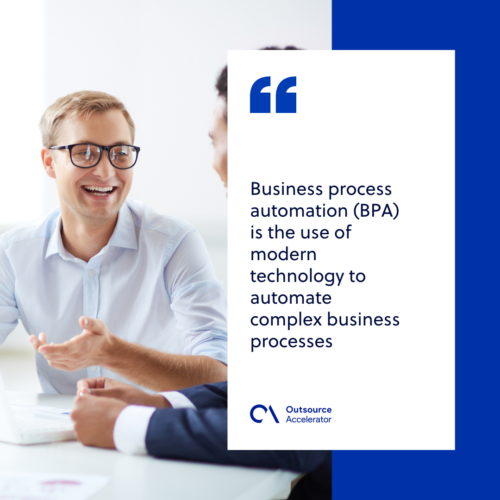Business process automation (BPA)
Definition
Business process automation (BPA) definition
Business process automation (BPA) is the use of modern technology to automate complex business processes and tasks that go beyond traditional data processing and record-keeping activities.
It focuses on automation efforts, working with event-driven, mission-critical main activities. BPA helps businesses in meeting the demands of their various customers.

Why should you automate business processes?
There are various reasons businesses should automate their business processes, including:
Accelerate digital transformation
Business process automation serves as a stepping stone toward continuous digital transformation by gradually increasing the productivity of the workforce.
Clarify processes
You can’t design an effective workflow if you don’t know what activities are involved and who is in charge of conducting them. After gaining insights from analyzing an automated process, it can show the difference between your process as it is and what it should ideally be.
Streamline processes
BPA makes reduces unnecessary operations so that the company can focus on tasks that create value. This helps improve the overall efficiency and productivity at every point of the process.
Get compliance records
Business process automation can document procedures and can be used during audits to ensure full compliance.
Standardize operations
When a business process is automated, you can expect reliable results every time, which can lead to growth in your client base.
Increase customer satisfaction
The level of customer satisfaction is what gives your company a competitive edge in the market as more people develop a preference for your brand. Focusing on process and operational excellence allows you to easily meet customer expectations and achieve business goals.
What are the types of business process automation?
Here are the types of business process automation:
Basic automation
Providing a centralized location to store a collection of linked data is called basic automation. It is the most basic task that can be completed in the automation process.
Process automation
Process automation is used to document and manage the corporate processes of the organization such as budgeting and project management in a network of software and applications.
Integration automation
Enabling machines and software to monitor, analyze, and imitate how employees execute activities is the process of integration automation.
Artificial intelligence (AI) automation
Artificial intelligence (AI) automation is the process of combining AI with your integrated software tools to make faster, wiser decisions.
With the data supplied to it, the system can now make decisions on your behalf. When machine learning is added, the AI system analyzes newly added data.

What are the examples of business process automation?
The examples of business process automation provided below show how it might be implemented in the organization.
Onboarding new employees
By using business process automation, hiring additional employees and other HR responsibilities can be done seamlessly.
Purchasing order requests
Business process automation can be used to automatically approve purchase order (PO) requests, reducing the time spent answering the forms. BPA can also capture and organize the data flowing among all of the decision-makers involved in the process.
Operations management
In operations management, business process automation can record and store all of the resources, and action stages in a particular project.
Customer support
BPA allows you to establish standard responses to typical issues appearing in your SaaS application, and this can be done using keywords and phrases.
Social media management
Business process automation can lessen labor hours in the marketing side of the business like social media management. For instance, automation tools let you plan posts ahead of time.







 Independent
Independent




